Towards the renewal of the UNIFIL mandate at the end of the month, the United States announced this week that it would veto the UN Security Council resolution concerning the continuation of UNIFIL’s activities, if the requirements for improving its operations were not accepted. According to the Asharq Al-Awsat Newspaper, France refused the US demand to introduce substantial changes to the UNIFIL mandate under UNSCR 1701. France also refused a reduction in UNIFIL’s personnel, budget and timeframe of operations under the framework of the mandate (i.e. extending the mandate every six months and not every year as is done today).
The American announcement comes after 14 years of UNIFIL’sactivity in its current form, according to which in the framework of UN Security Council resolution 1701 its main task is to fulfill;
“Security arrangements to prevent the resumption of hostilities, including the establishment between the Blue Line and the Litani river of an area free of any armed personnel, assets and weapons other than those of the Government of Lebanon and of UNIFIL “; ….”.
The UNSC also authorized UNIFIL “to take all necessary action in areas of deployment of its forces and as it deems within its capabilities, to ensure that its area of operations is not utilized for hostile activities of any kind”
Yet, in the past 14 years, UNIFIL has failed to prevent Hezbollah from re-deploying in southern Lebanon as well as failing in preventing the organization from positioning tens of thousands of rockets in the UNIFIL area of operation.
Due to this, and in light of Israel’s repeated demands that UNIFIL fulfill the mandate given to it, the Security Council in recent years has repeatedly demanded that UNIFIL expand its patrols on the ground and its reports concerning Hezbollah violations.
On August 31, 2019, the Security Council also called on the Lebanese government to allow UNIFIL freedom of maneuver and action without restricting their movements, along with the call to increase reporting regarding the transfer of weapons to terrorist elements.
The next day (September 1), Hezbollah fired an anti-tank missile from the Lebanese village of Maroun al-Ras at a military vehicle traveling inside Israeli territory. To date, due to Hezbollah’s directive, UNIFIL is prevented from reaching the firing incident location.
Over the years, UNIFIL has refrained from entering large areas of southern Lebanon, including those suspected of harboring Hezbollah activity and alleged weapons depots, claiming that these locations are “private property” and that UNIFIL has no authorization to do so under its current mandate.
In other cases, where UNIFIL attempted to patrol areas suspected of Hezbollah activity, they were required to coordinate the patrol in advance with Lebanese military officials and only after coordination, if at all, was UNIFIL allowed to enter these areas. Due to the coordination in the field between the Lebanese army and Hezbollah, it is likely that any such “coordination” request would be submitted for Hezbollah approval, this goes to show that Hezbollah is the sovereign of the territory and not the Lebanese government.
For an example, see the incident of the torching of a UNIFIL patrol vehicle and the beating of its personnel in the village of Majdal Zoun in August 2018.

In January 2020, men in civilian clothing (apparently members of Hezbollah) from the town of Nabatiyeh El Faouqa (Upper Nabatiyeh) north of the Litani River blocked the road in front of a UNIFIL patrol, confiscating their telephones and the GPS device from their vehicle. Although the UNIFIL patrol was traveling outside its sector and authorized zone, the ease with which Hezbollah operatives blocked it and overpowered it, is in fact intolerable… Another incident took place in the village of Blida on May 1, 2020, in which, in our estimation, UNIFIL personnel travelling in their jeeps lost their way. When they realized they were lost, they were frightened and worried for their safety fearing Hezbollah repercussions. Therefore, they began to drive wildly fleeing the scene while injuring local residents and their property. (UNIFIL in southern Lebanon – Under constant threat!)
The bottom line is that Hezbollah places restrictions on UNIFIL’s freedom of movement, regardless of the issue of “private property”, in a way that does not allow it to execute its mandate. In our view, any attempt by UNIFIL to increase field patrols in areas controlled actually by Hezbollah will inevitably lead to a violent clash between the force’s soldiers and Hezbollah operatives.
An additional incident took place on July 26, 2020 near the town of Al Wazzani, showing that even the civilian population in southern Lebanon does not adhere to UNIFIL. The vast majority of the population in southern Lebanon is Shiite. This population forms the base of Hezbollah’s support. This population has not participated in recent demonstrations, thus displaying blind loyalty to Hezbollah.
According to this incident, the civilian population in southern Lebanon is also making it very difficult for UNIFIL to accomplish its mission:
On the backdrop of tensions on the Israeli-Lebanese border, the UNIFIL Spanish battalion carried out operations near the al-Wazzani village in southern Lebanon (east of the Israeli community of Metula).
لحظة إطلاق عنصر اليونفيل النار على رعاة للأغنام عند الحدود اللبنانية الفلسطينية pic.twitter.com/gZBDKHv4hk
— يونس الزعتري #عين_على_العدو (@YounesZaatari) July 26, 2020
The video shows one of the UNIFIL soldiers acting under great pressure, fear and distress firing a lone bullet into the air from his weapon (apparently accidentally) as a local vehicle continues its slow movement even though UNIFIL soldiers stood and blocked the road. Inside the vehicle, one of the citizens says, with great disrespect, “Well … shoot … shoot …” in a contempt tone, expressing the general state of mind of the civilian population towards UNIFIL. This general state of mind among the population is influenced by the campaign led by Hezbollah, whose main narrative is that UNIFIL is another arm of the “Zionist enemy”… In addition to public opinion, the local authorities themselves do not encourage UNIFIL’s military activities as required by Resolution 1701, and in response to the incident, the Wazzani municipality issued a condemnation following the conduct of the UNIFIL soldiers…
In the first years after the Second Lebanon War, Hezbollah made sure to hide its military activity on the ground, its operatives refraining from walking about in uniform with weapons or any other military characteristics. It was even very difficult to find Hezbollah flags on the border.
In recent years, Hezbollah’s self-confidence along the border has risen with its operatives on the ground conducting a high-profile presence. Not only are Hezbollah flags hoisted alongside the border, but also posters threatening Israel, sometimes in close proximity to UN positions. In this context, even at Hezbollah civil ceremonies in villages within the UNIFIL operational areas, Hezbollah operatives appear in uniform in public. For example, many of the Hezbollah operative’s funerals in the villages of southern Lebanon are performed with a full military ceremony, while its operatives are openly present in full military attire, while defying and conveying a clear message: Hezbollah is the reign.For example, you can see in the attached video from the recent funeral of a Hezbollah operative killed in Syria as a result of an air strike. The funeral took place on July 22, 2020 in the village of Aititsouth of the Litani River in southern Lebanon:

One cannot say, despite all this, that UNIFIL does not contribute. In operation Northern Shield, in which the IDF exposed Hezbollah’s cross-border tunnels, UNIFIL’s presence on the ground was of great importance, as the IDF often worked in Israeli territory north of the fence needing the presence of an international force to prevent escalation due to friction between Hezbollah operatives or Lebanese army soldiers and IDF soldiers.
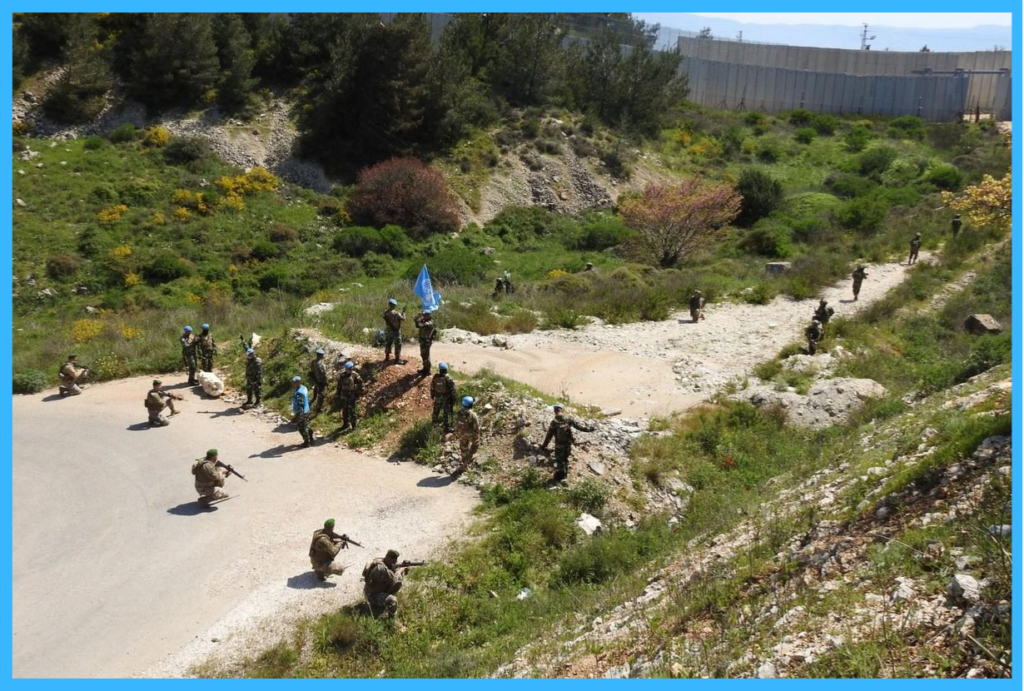
Over the years, UNIFIL has been the facilitator of dialogue between the Lebanese army and the IDF as part of the trilateral meetings in which tactical on ground issues were discussed. The involvement of the UN force had a stabilizing and moderating significance in many cases.
In recent years, both sides enjoyed relative peace in southern Lebanon, but make no mistake, if Hezbollah wants to carry out an attack against Israel, UNIFIL does not have the ability to prevent it, as evident in a number of terrorist attacks carried out against Israel by Hezbollah from the border in recent years. The last attempted attack was on July 27, 2020, when an armed Hezbollah squad tried to infiltrate Israeli territory in the area of the Shebaa Farms (Mount Dov) intending to fire anti-tank weapons at an IDF post in the area. The IDF thwarted the squad’s intentions. As of now, Nasrallah has stated that despite all the developments in Lebanon (the explosion in Beirut port), Hezbollah has not annulled the decision to retaliate the martyr’s death in Syria last month (see his latest speech from August 14).
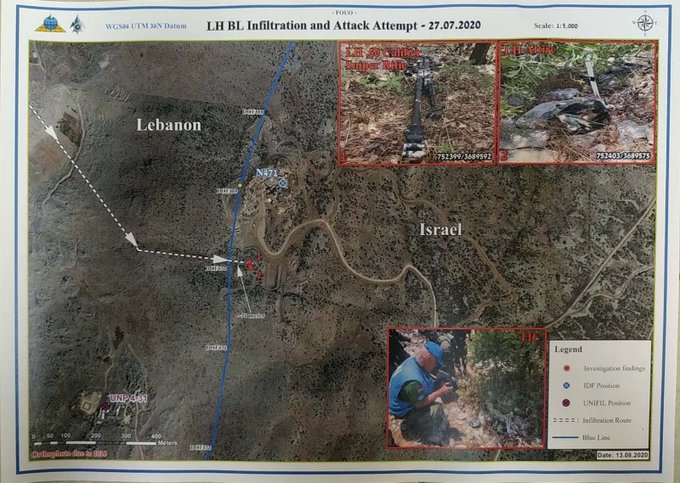
The Security Council’s repeated attempts to get UNIFIL to implement its mandate so that it could prevent Hezbollah’s military presence in southern Lebanon are commendable. There is no doubt that the explosion in Beirut is leading many in Lebanon and abroad to “re-calculate their route and re-evaluate their policy” regarding Hezbollah’s excessive power in the country. However, it is important to emphasize again that any UNIFIL attempt to prevent Hezbollah from being present on the ground will inevitably lead to a violent confrontation between them.
In light of all this, in our view, it is possible to settle for a small force, with high tracking, control and reporting capabilities, with minimum danger to the force’s soldiers. A force that can, on the one hand continue to coordinate between the Lebanese army and the IDF, mediate in border disagreements between the two countries and prevent deterioration to unwanted escalations, and on the other hand a force that can report on occurrences on the ground without risking a violent confrontation with Hezbollah.
It is important to clarify that in the event of war breaking out between Israel and Lebanon; Hezbollah will use its human shield tactic, consequently constituting a clear and immediate danger to the 10,500 UNIFIL soldiers in the area, therefore, reducing the forces numbers would reduce the danger in this scenario as well.


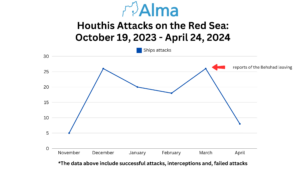
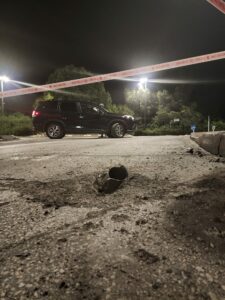
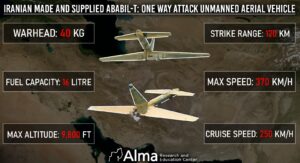

One Response